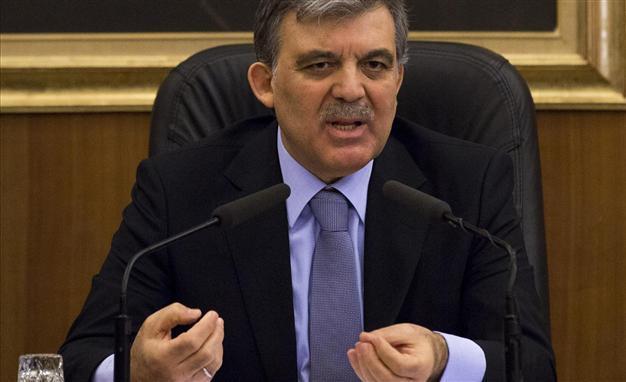Turkish President Gül steps in for ending Twitter blackout
ANKARA

'It is not legally possible to shut down the Internet and platforms [like Twitter],' said President Gül ahead of his departure for an official visit to the Netherlands on March 23. AA photo
President Abdullah Gül has stepped in to end the Twitter blackout, saying his office is in talks with the U.S.-based microblogging site for the establishment of a “healthy dialogue” for a quick resolution of what he described as “this bitter situation.” Gül, who was the first to break the government-imposed block on Twitter to express his disturbance through his account, suggested that the blanket shut down of websites or social media was not legal.
“I visited Silicon Valley in 2012. I held meetings with companies like Facebook, Twitter and Google. There, I met with the owner of Twitter, Dick Costello. When this problem emerged, I instructed my advisors to start a dialogue,” Gül told reporters on March 23, ahead of his departure for the Netherlands. He also said that he had spoken over the phone with a number of Turkish ministers and had information in hand from senior bureaucrats on the government’s move to block the use of Twitter in Turkey.
The government’s Internet watchdog instituted the ban on Twitter late March 20, soon after Prime Minister Recep Tayyip Erdoğan vowed to “wipe out” the social network. The move came after the release of documents and leaked phone conversations between him and his family members, as well as businessmen, allegedly revealing huge levels of corruption. The ban was widened over the weekend after Turkish users circumvented the blockage.
“Turkey may have rightful demands. These demands should be understood and talks should start immediately. We have always had high-level responses from them. I hope this will be resolved quickly. This is, of course, an unpleasant situation for such a developed country as Turkey, which has weight in the region and is negotiating with the European Union. Therefore, it will be overcome soon,” Gül said.
He also stressed that the government’s move had not been able to stop the use of Twitter, as the number of tweets since the blackout was nearly doubled. “This is today’s technology. We all have to be aware of it. There may be problems with such giant communication platforms. There is a need to have healthy dialogue and communication channels even before these problems appear,” he said, adding that one of the problems was the fact that Twitter does not have an office in Turkey.
Gül said it was a positive development that Twitter had hired a lawyer in Turkey.
Turkey has more than 12 million Twitter accounts and is among its top five countries, with Turkish-language tweets regularly appearing in the list of worldwide top trends.
Gül said he was informed about certain court decisions regarding a number of Twitter accounts, through which privacy had allegedly been violated, expressing his hope that Twitter will understand these calls and will take necessary measures. He said a blanket shut down of such social media forums was not legally possible and the best way would be to close accounts or pages through court cases in the event that their content broke Turkish laws.
The president is known as a social media enthusiast, and took to Twitter on March 21 to criticize the government’s ban hours after the network went dark. He thus became the highest-level leader in the country to circumvent the block, along with a number of other ministers.
When reminded that a ban on Twitter could be imposed because of a recent legal amendment on the Internet Law that entered into force after his approval, Gül acknowledged that he signed the bill into law, but only after receiving assurance that it would be softened.
“We agreed to clear problematic aspects of the law within a week, so the law was changed in the following week. In fact, complete closure of the Internet or such platforms is not legally possible,” he said.
Gül doesn’t rule out PM’s claimsGül also responded to questions about Erdoğan’s recent claims that the president’s phone calls would be leaked “when necessary.”
“To be honest, I cannot rule out claims about me. Because of technological advancements, it’s not fully possible to avert them. But I would like to say I have no fear or concerns about it,” he said.
Gül also repeated that he had no confirmation that he was also wiretapped by identified groups within the state.
The president noted that leaks of phone recordings clearly show some state officials had abused their duties and broke the law. “Procedures about this issue should be documented within the legal framework and those who have broken laws should be punished in line with our laws,” he added.
